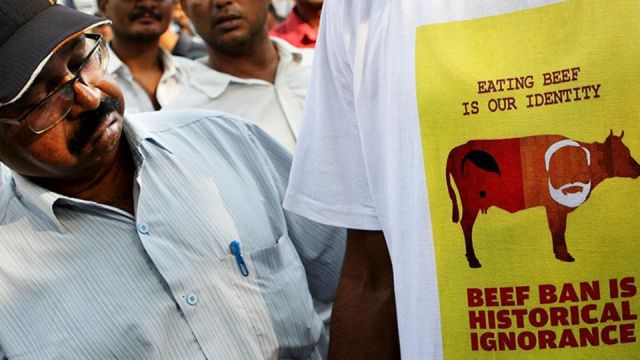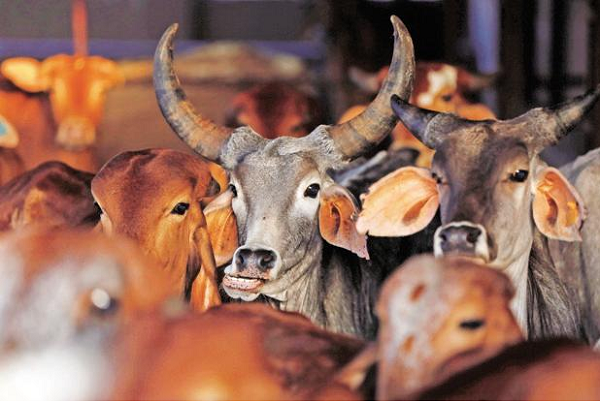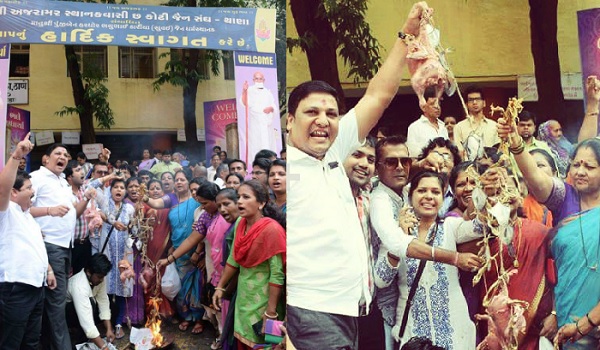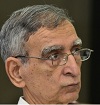
by admin | May 25, 2021 | Halal Food, Halal Industries, News, Politics

A student wears a T-shirt with a message protesting Maharashtra government’s beef ban order. (HT File photo)
Panaji : Harassed by vigilante groups, Goa’s only beef traders association on Friday said they will go on an indefinite strike from Saturday, until the government cracks down on vigilante groups who hamper bringing in beef from neighbouring states.
The association said the strike would go on till the government eases procedures to bring beef into the coastal state.
Speaking to IANS, Manna Bepari, President of the Qureshi Meat Traders Association of Goa said no beef would be available for sale in Goa, until the government steps in and resolves the issue.
“We are tired of these raids. They are not allowing our business to function. Every other day these groups target the beef consignments which we order from the open market in Karnataka and government officials also keep harassing us,” Bepari said.
“No beef shop will be open until the government helps us and stops these vigilant groups from taking law in their hands,” Bepari said.
He also said that more than five raids were conducted in the last few weeks, especially during the Christmas and New Year period, when sale of beef is at its peak in Goa.
Beef is normally consumed in the form of stew, curries, roasts, soups and is an essential protein, and one of the cheapest meats in most Christian and Muslim homes in the state.
Minorities comprise more than 30 per cent of the state’s 1.5 million population.
Cheaper than mutton, beef is also commonly consumed in the tourism-oriented coastal belt, which sees nearly six million tourists, half a million of which are foreigners.
According to official statistics from the Goa Meat Complex, the state’s only abattoir facility allowed to slaughter cattle and buffaloes, the state consumes nearly 30 tonnes of fresh beef every day.
And with the Complex not functioning to full capacity over the last few months, a majority of the beef is brought in from Karnataka by the meat traders in Goa.
—IANS

by admin | May 25, 2021 | News, Politics
 New Delhi : The Supreme Court on Friday said that its holding of the right to privacy to be a fundamental right could have some bearing on the hearing of a batch of petitions including by Maharashtra government challenging the Bombay High Court verdict permitting the possession and eating of beef brought from outside the state.
New Delhi : The Supreme Court on Friday said that its holding of the right to privacy to be a fundamental right could have some bearing on the hearing of a batch of petitions including by Maharashtra government challenging the Bombay High Court verdict permitting the possession and eating of beef brought from outside the state.
“Yes, that judgement may have some bearing in these matters,” the bench of Justice A.K. Sikri and Justice Ashok Bhushan said as senior counsel Chander Uday Singh urged the bench to give them time to study the judgment by the nine judge bench which may have bearing on their matter.
The judgment pronounced by a nine-judge bench on Thursday has held that the right to privacy was a fundamental right.
Chander Uday singh who appeared for a Mumbai-based lawyer Haresh Jagtiani referred to Justice J.Chelameswar’s judgment on privacy which said: “I do not think that anybody would like to be told by the State as to what they should eat or how they should dress …”
Appearing for some other petitioners, senior counsel Indira Jaising told the court that 2005 majority judgment (6-1) by a seven judge bench had wrongly decided in favour of complete prohibition on the slaughter of cows and calves including other milch and draught cattle.
She said that Mirzapur judgment as 2005 judgment is commonly known in legal circles needs to be relooked and urged the court to pass necessary orders.
At this, the bench said that it would consider whether this should be sent to a larger bench.
While permitting the possession and eating of beef brought from outside Maharashtra, the Bombay High Court had by its May 6, 2016, judgment had uphold the ban imposed by the state government on the slaughtering and sale of beef within the state.
The Maharashtra government had moved the top court on August 10 challenging this verdict.
The top court is hearing a batch of cross petitions including one by Akhil Bharat Krishi Go Sewa Sangh, which questioned the high court judgment holding that the right to eat was a fundamental right forming a part of right to privacy.
—IANS

by admin | May 25, 2021 | News, Politics
 Mumbai, (IANS) In a significant verdict, the Bombay High Court on Friday ruled that possession of beef slaughtered outside Maharashtra would not be a criminal offence but it upheld the government’s decision to ban the slaughter of bullocks in the state.
Mumbai, (IANS) In a significant verdict, the Bombay High Court on Friday ruled that possession of beef slaughtered outside Maharashtra would not be a criminal offence but it upheld the government’s decision to ban the slaughter of bullocks in the state.
The ruling by a division bench comprising Justice A.S. Oka and Justice S.C. Gupte came on a bunch of petitions challenging the provisions in the Maharashtra Animal Preservation (Amendment) Act which stipulated penal action even for possession of beef brought from outside the state.
Accordingly, while slaughter of bullocks would not be permitted, the court has permitted the import and consumption of beef from other states to Maharashtra.
The President had granted assent to the Maharashtra Animal Preservation (Amendment) Act, which prohibited slaughter of bulls and bullocks as well as possession and consumption of their meat in the state.
The Act stipulated a five-year jail term and Rs.10,000 fine for slaughter of bulls or bullocks and one-year imprisonment and Rs.2,000 fine for possession of its meat.

by admin | May 25, 2021 | Opinions

Ram Puniyani
By Ram Puniyani
The intolerance does not grow in one field of social life in isolation. In different arena of our life it tends to run in a parallel manner. In Maharashtra, with the BJP majority Government in seat of power, we had a ban on the storing, selling and eating of beef few months ago. This ban increased the problems of a large section of society, the workers in abettor, those consuming beef and those selling beef. The workers of Devnar abettor, located in Mumbai, the biggest one in the area, rendered jobless due to this decision of the Government are writhing in the pain of unemployment. Then came the Government order that any criticism of Government servants will be treated as sedition. This is an attempt to put a total cap on the basic democratic rights, on freedom of expression and on the right to dissent. During this period the state witnessed the murder of two of its foremost rationalist thinkers and leaders, Dr. Narendra Dabholkar and Comrade Govind Pansare (who was also a political worker) for taking on the forces of blind faith and for promoting scientific temper. In the neighboring Karnataka the ex-Vice Chancellor of Kannada University, Hamphi, the tall scholar of Kannada and rational intellectual was done to death.
On the heels of this comes the decision of Mira Bhaynder Municipal Corporation to ban the non vegetarian food, except fished and eggs, during Paryushan, a Jain festival, for eight days. This ban has been put for four days in Mumbai area under Mumbai Corporation. BJP is in lead in taking decisions in this direction. As such over a period of time the number of days for which this ban has been there is proportionally going up with the rise of sectarian politics in the nation and in the state. As such earlier during Paryushan the ban was there for one day in 1960s, two day in 1990s, now it is four days in Mumbai and eight days in Mira Road-Bhayander area. Interestingly fishes and eggs which Jains don’t consume have been spared from the wrath of the zealots who think imposing your sentiments is part of one’s religion. Will there be such a demand for prohibiting garlic and root vegetable, which are also prohibited by Jain practices, next?
Country as a whole has been the victim of this food fundamentalism of the dominant forces. There are housing societies in Mumbai where the non-vegetarians are not allowed to stay. In Ahmadabad, Gujarat I came across an interesting incident. I was staying with a friend, who was living in a rented accommodation. Suddenly one morning when we were sipping our morning tea, the landlord barged in and headed straight to the kitchen. And then after few minutes he made his exit. I was puzzled. My friend explained that it is “Kitchen Check’ to examine whether any non vegetarian food is being cooked or consumed! It was very baffling moment for me. One knows that there is a sort of ‘food curfew’ during the day time during Ramzan month in many Gulf countries, where Sheikhs are ruling with iron hand, in the name of Islam. Which community and whose sentiments will prevail in a diverse society is a complex question.
How does one handle the food habits in a diverse society like ours? As such earlier also many a kings have respected the sentiments of the minorities. Akbar when approached by the Jain delegation did impose restriction on Non vegetarian food for some time. Babar in his will to his son Humayun instructs that cow slaughter should not be permitted as deference to Hindu sentiments. As such the basic aspect of teachings of religion is to respect the feelings of other people in the society. What is taught is that the followers of that religion implement these in their lives. The question of imposing one’s sentiments on the others is the sign of one’s social dominance in the society. Communal parties for the sake of vote bank and for their political social agenda are feeling they can have their way and impose such practices on the society. There are others who feel grateful enough if they can practice their own things in their own family and social space without imposing it upon others.
As such what should happen in a democratic society? It’s very complex question at one level. Point should be to respect each other’s feelings and accommodate for that. Ideal is that the ‘other’ calls for such a self imposition out of volition and respect. That’s what Mahatma Gandhi teaches us time and over again. Be it the matter of religious practices or food habits, his path was clear, lets follow our path without imposing it upon others. As such, imposing one’s sentiments on ‘others’, is the highest form of violence. One of Gandhi’s writing on the issue of beef eating- cow slaughter is very illuminating, he writes “I maintain that Muslims should have full freedom to slaughter cows, if they wish, subject of course to hygienic restrictions and in a manner not to wound the susceptibilities of their Hindu neighbors. Fullest recognition of freedom to the Muslims to slaughter cows is indispensable of communal harmony, and is the only way of saving cow.”(http://www.mkgandhi.org/g_communal/chap14.htm)?
Our country has diverse food habits, from Arunchal Pradesh to Kerala to Punjab and Gujarat, we inherit the rich diversity. With the rise of the sectarianism and politics in the name of Hindu religion, Hindutva, such intolerant things are being brought in with bigger aggression. The section of Jain leadership, which getting this done, is close to the BJP. BJP in turn has an agenda in all aspects of our socio-cultural life. Ban on Beef eating is a deliberate ploy to sharpen the divisive politics, the politics which is polarsing the communities. One recalls the 1946 V. Shantaram Classic film Padosi, where the two neighbors, Hindu and Muslim, love and respect each other’s sentiments and feelings. There are legions of stories in times past where such camaraderie amongst these communities was a matter of celebrating each other’s practices not just tolerating them. It is this intermixing at all the levels which gave us the diverse plural heritage, the culture of joy and celebration of diversity in our country.
Such issues related to bans have become an integral part of identity politics, Islamism in Gulf countries and Hindutva in India. This is painfully gripping our democratic society by the neck and imposing suspicion and dislike for the ‘other’. The economic aspects of banning beef, and banning selective non vegetarian food during the Paryushan is of no concern to the political leaders who keep deepening their hold on the section of community not by harping on issues of dignity and rights of the people but by the intolerant attitude for the ‘other’.
From over last one year, this stifling attitude is a retrograde step, putting chains on our democratic freedoms. This is a regressive march inching towards the pattern of countries where democratic freedoms have been put under the carpet in the name of religion.

by admin | May 25, 2021 | Halal Food, Halal Industries, News, Opinions

Meat traders stage a protest against the ban on the slaughter of bulls and bullocks, at Azad Maidan (Courtesy: Express photo by Pradeep Kochrekar)
By Ram Puniyani
Can the dietary practices, the animal which is worshipped as a mother by section of population, be brought in on the political arena? While all this sounds surreal, its true as far as the role of cow is there in Indian political firmament. Recently Maharashtra Government got the Presidents assent to the bill “Maharashtra Animal Preservation (Amendment) Bill 1995 which will now ban the slaughter of bulls and bullocks as well. The defaulters will face a prison term of five years and a fine of Rs. 10000. When I first read ‘Animal Preservation’ part of the title of the bill, I thought this is some bill related to all the animals which are used for human consumption or deals with the use of animals for different purposes by the society. Contrary to that it turned out that this applies only to Cow and its progeny. A decade ago I was shocked to read that one of the outstanding scholars of ancient Indian History Professor Dwijendra Nath Jha received regular threats on phone telling him not to publish his book, ‘Holy Cow Beef in Indian Dietary tradition’. This scholarly work traces the place of beef in Indian diet from centuries.
The idea is to target the minorities for beef eating, and cow slaughter. One recalls that one of the slogans which rent the air in the run up the 2014 General elections was “Modi ko matdan, gai ko jeevadan [Vote for Modi, give life to the cow], BJP ka sandesh, bachegi gai, bachega desh [BJP’s message, the cow will be saved, the country will be saved]”. This slogan was propped up ‘Cow Development Cell’ of BJP.
As such emotive-identity issues are the hall mark of the politics in the name of religion. BJP built itself up on another identity issue, that of Ram Temple. The cow has always been accompanying and a parallel issue for political mobilization by RSS-BJP. It has also been the point of triggering violence in many cases all through. With the formation of VHP by RSS in 1964, cow issue has been systematically propped up time and over again. Many a misconceptions about cow, beef eating have been constructed. Building of misconceptions has also been extended to the dietary habits of the ‘Muslim’ community in particular. The profession of section of Muslims, Kasai (butcher), those in the trade of beef selling has been brought in to the ‘Hate other’, ‘social common sense’ in particular. The result being that it is perceived at broad layers of society as if beef eating is compulsory for Muslims. The notion which has been popularized is that Cow is Holy for Hindus: Muslims kill her! The perception is that the Muslim invaders brought beef eating into India. These misconceptions are by now the part of ‘social common sense’ of the large number of people in the society.
All the components of this are myths and stereotypes have been constructed over a period of time. Time and over again one hears about some small communal violence, killing of dalits and traders of cows leading to communal polarization. Many a dalits dealing with cow hide have been killed in places like Gohana in Hariyana and the VHP leaders had justified such acts.
Contrary to this the beef eating and sacrifice of cows was prevalent here from Vedic period. The sacrifice of cows in the Yagnas (ritual around fire) is extensively mentioned in the scriptures. There is mention about beef eating in various books. There is a phrase in Taitreya Brahmin which states ‘Atho Annam Via Gau’ (Cow is in veritably food) Different gods are mentioned to be having their choices for particular type of cow flesh. Prof D. N. Jha quotes innumerable examples of this in his masterpiece.
The preaching of non violence in India came with the rise of agricultural society. Jainism called for total non violence, while Buddhism talked non-violence; preventing of wasteful animal sacrifice in particular. It was much later that Brahmanism picked up cow as a symbol for Brahmanism in response and as a reaction to non-violence of these religions. Since Brahmanism has asserted itself to be the Hinduism it projects as if Cow is holy for Hindus overall. The matter of fact is that many sections of society, more particularly Dalits and Tribal have been eating beef all through. It is another matter that lately with the rising assertion of Hindutva, many a communities which are dependent on beef as a rich and cheap source of protein are gradually being forced to either give it up or do a rethink on that.
In contrast to what is being asserted by BJP and company, Swami Vivekanand had a different take on the issue. He points out speaking to a large gathering in USA said: “You will be astonished if I tell you that, according to old ceremonials, he is not a good Hindu who does not eat beef. On certain occasions he must sacrifice a bull and eat it.”
[Vivekananda speaking at the Shakespeare Club, Pasadena, California, USA (2 February 1900) on the theme of ‘Buddhistic India’, cited in Swami Vivekananda, The Complete Works of Swami Vivekananda, Vol 3 (Calcutta: Advaita Ashram, 1997), p. 536.]
This is corroborated by other research works sponsored by the Ramakrishna Mission established by Swami Vivekananda himself. One of these reads: “The Vedic Aryans, including the Brahmanas, ate fish, meat and even beef. A distinguished guest was honoured with beef served at a meal. Although the Vedic Aryans ate beef, milch cows were not killed. One of the words that designated cow was aghnya (what shall not be killed). But a guest was a goghna (one for whom a cow is killed). It is only bulls, barren cows and calves that were killed.”[C. Kunhan Raja, ‘Vedic Culture’, cited in the series, Suniti Kumar Chatterji and others (eds.), The Cultural Heritage of India, Vol 1 (Calcutta: The Ramakrishna Mission, 1993), 217.]
In response to this bill thousands of workers of Devnar abattoir (Mumbai), who will be losing their jobs came on the streets to protest against this move of the government (March 11). Many traders, from different religion also came to Azad Maidan in Mumbai to protest this communal act of the Maharashtra Government. In a PIL filed in the Bombay High Court the petitioner argues that this ban on beef infringes on the fundamental right of citizens to choose meat of their choice is fundamental. The hope is that the society overcomes such abuse of ‘identity issues’ for political goals and lets the people have their own choices in matters of food habits, and let those who are making their living from this trade do so peacefully.
—







